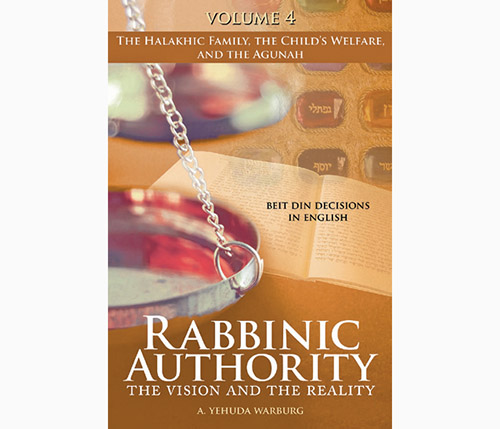
Highlighting “Rabbinic Authority: The Vision and the Reality” By A. Yehuda Warburg. Urim Publications. Hardcover. 2018. ISBN-13: 978-1602803060
“Rabbinic Authority: The Vision and the Reality” is the fourth in a series of volumes that deal with the family, the child’s welfare, halachic divorce in general and the workings of the institution of the beit din (rabbinic arbitration) dealing with the modern-day agunah in particular.
In the event that a Jewish husband fails to give a get to his Jewish wife, in eight rulings Rabbi Warburg addresses in the following scenarios whether a wife can be freed without the giving of a get by her husband: Is there halachic validity of the marriage of a woman to a mumar, an apostate? If a husband is infected with HIV and the sexually transmitted disease is transmitted to his wife and knowingly she continues to remain intimate with him are there grounds to be mevatel the kiddushin, to void the marriage? If a wife argues that her husband is unable to copulate, is there a basis for voiding the marriage? If the husband suffers from a delusional jealousy disorder and engages in spousal rape, is there halachic support for freeing the woman without a get? If a wife claims that her husband engages in spousal rape, refrains from financially supporting her (mezonot isha), emotionally abuses her and his stepchildren and he remarries without giving her a get, are there grounds to being mevatel the kiddushin? If a husband engages in pedophilia with his stepdaughters is there a halachic foundation to void the marriage? If a wife contends that she is a victim of domestic violence and subsequently the husband is incarcerated in a French prison for 10 years for an attempted homicide of his wife, which happened 16 months after their separation, are there grounds to free her without a get? Finally, if a husband suffers from a bipolar disorder, is there a basis for voiding the marriage?
In short, in this work, Rabbi Warburg “shatters the silence” by communicating to the reader the different techniques that have been utilized by rabbinic authorities throughout the ages, dating back to medieval times to address the plight of the modern-day agunah. Freeing an agunah in many cases minimally results in the preservation of her emunah, faith commitment and her mental health; maximally it may involve pikuach nefesh, the saving of human life. In his earlier work dealing with halachic divorce, the author writes that he has dealt with three agunot who have threatened to commit suicide due to their intractable situation.
Accompanying these rulings, there are essays focusing upon Rabbi Elyashiv’s heter, permission to execute a get where a husband has remarried without giving his first wife her get (known as a get zikui), halachic and American legal approaches to dealing with child custody, a systematic review of the collection of rulings titled “Ein Tenai be-Nissuin” published in 1934 in Vilna, the propriety of certain types of prenuptial property agreements, the consequences of breaching a promise to marry and whether there is basis in halacha and secular law to allow teachers to mete out corporal punishment to their students.
For over two decades, Rabbi Warburg has delivered classes in Hoshen Mishpat and Even ha-Ezer to Yeshiva University’s semicha students. Since 1999, he has been serving as a dayan, an arbitrator on various battei din panels in the Chassidic, Modern Orthodox, Sephardic and Yeshiva communities in the NY-NJ metropolitan area. Presently, Rabbi Warburg serves as the director and a dayan for the International Beit Din located in New York City, which deals with matters of divorce.
This book is available in local seforim stores and on Amazon.com.










